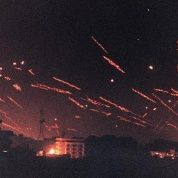Background

The 1979 Iranian Revolution was the trigger that led Iraqi leader Saddam Hussein to invade Iran over territorial disputes, as well as religious rivalries between Iran’s Shiite and Iraq’s Sunni factions. During this time, U.S. support for Iraq was hardly a secret; the region was frequently discussed in sessions of the Senate and House of Representatives.
Hussein’s campaign was sponsored by the Gulf monarchies as well as Western nations — and their many defense contractors, who foresaw bankruptcy as the Cold War came to a close — who supplied him with the necessary artillery to fight Iran and later Kuwait.
ANALYSIS: First Gulf War: US First Push for Post-Soviet World Order
By the early 1990's Iraq was a military giant in the Middle East, however after the war with Iran it had a massive debt to many Arab nations, including Kuwait.
The Gulf monarchies wanted their money back, but Hussein rejected this given the efforts Iraq had made to stem the spread of the Iranian revolution in the region.
Hussein made a request to its oil-rich neighbor Kuwait to forgive his US$65 billion debt, however the Gulf monarchy declined the petition and Iraq complained to OPEC, claiming that Kuwait was stealing its oil from a field near the border by slant drilling of the Rumaila field. By that time, Kuwait was the most developed country in the Middle East.
ANALYSIS: First Gulf War: US First Push for Post-Soviet World Order
Using a small portion of its troops, Iraq invaded Kuwait on Aug. 2, 1990. According to press reports of the time, it took the Iraqi army just six hours to reach the capital city. Hussein was also seeking to recuperate the Bubiyan and Warbah islands, which were very important for his geopolitical strategy inside the Gulf.
Almost immediately, Western politicians lined up to denounce these events, going as far as to compare Iraq’s invasion of Kuwait to Hitler's invasion of Poland.
Six days after the invasion, U.S. President George H.W. Bush announced the deployment of 250,000 U.S. troops to "deter Iraqi aggression": the Gulf War had begun.
International Hypocrisy
President Bush said he wanted to “free” Kuwait, but also insisted that the United Nations Security Council had also an important role in this matter as the body in charge of preserving world peace through actions against the “bad guys.” At this time geopolitics meant the U.S. was backed up by Moscow.
Empowered by a United Nations resolution, Western and Gulf nations united to form a coalition against Iraq.
In a televised address, Bush announced the impending military offensive against Hussein and Iraq:
“A puppet regime imposed from the outside is unacceptable. The acquisition of territory by force is unacceptable. No one, friend or foe, should doubt our desire for peace and no one should underestimate our determination to confront aggression ... America does not seek conflict. Nor do we seek to chart the destiny of other nations. But America will stand by her friends. The mission of our troops is wholly defensive. Hopefully, they’ll not be needed.”
While historians and others will debate whether the troops — numbering almost 1 million — were necessary, they were certainly used.
The U.N. General Assembly, although traditionally running counter to decisions made by superpowers, supported the military intervention. Given the shake-ups in Eastern Europe, there would be no Security Council veto either, paving the way for a legal and internationally sanctioned blood-bath.
What Happened Next?
As part of his campaign against Hussein, Bush used threats, bribery and intimidation to corral as many countries into the so-called “Coalition of the Willing” as he could. Aside from U.S. persistence, Saudi Arabia was also seeking to have the full control of oil production of the region and so also advocated on behalf of the “little” Kuwait.
The flailing USSR's potential veto on the Security Council to the intervention was avoided by having U.S. allies in the Gulf injection of US$4 billion to Moscow. As for China, Bush brought the emerging Asian giant onside by calming the international condemnation it had earned after the 1989 Tiananmen Square incident.
A total of 12 anti-Iraq U.N. Security Council resolutions were passed between August 1990 and April 1991.
In January 1991, Bush launched “Operation Desert Storm,” which began with the aerial bombardment of Baghdad. According to experts, in the 43-day air assault more bombs were dropped on Iraq than in any other aerial bombardment in the history of warfare. It was a slaughter of Iraqi troops, with U.S. forces bulldozing the bodies of thousands of soldiers into mass graves.
On Feb. 15, Saddam Hussein announced he would accept the U.N. resolutions, calling for withdrawal from Kuwait, however Washington and its allies dismissed Saddam's surrender. Instead, Bush called for Iraqis to rise up and overthrow Saddam.
Washington wanted to mount a ground offensive anyway, and they did so with thousands of ground troops sweeping across Kuwait and southern Iraq. Moreover, coalition forces bombed retreating Iraqi troops in what became known as the "Highway of Death."
Total coalition deaths numbered well under 1,000, according to the Congressional Research Service, many of whom were killed by friendly-fire or in non-combat circumstances. Meanwhile some 35,000 Iraqi troops are estimated to have been killed.
The U.S. remained in the area, purportedly to help Iraqi refugees and maintain no-fly zones over northern and southern Iraq. As Iraqi kurds can attest, this was only carried out selectively.
Hussein remained in power and Washington kept up a program of sanctions and bombing throughout the Clinton administration.
After the Sep. 11 attacks on the World Trade Center in 2001, President George W. Bush — son of the President who first waged war on Iraq — instructed his advisers to look for connections between Iraq and al-Qaida, in order to justify another U.S. invasion of the country in 2003.
